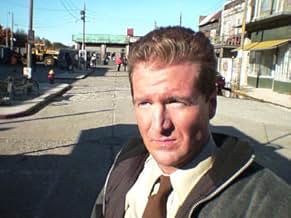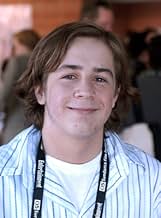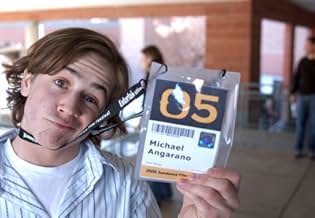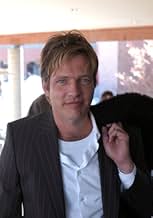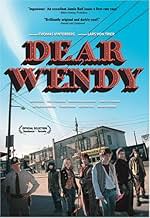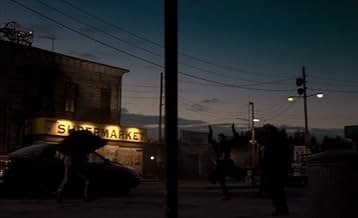VALUTAZIONE IMDb
6,5/10
10.614
LA TUA VALUTAZIONE
Un ragazzino, che vive in una cittadina americana senza nome e senza tempo, fonda una banda di giovani disadattati, uniti dall'amore per le armi e da un proprio codice d'onore.Un ragazzino, che vive in una cittadina americana senza nome e senza tempo, fonda una banda di giovani disadattati, uniti dall'amore per le armi e da un proprio codice d'onore.Un ragazzino, che vive in una cittadina americana senza nome e senza tempo, fonda una banda di giovani disadattati, uniti dall'amore per le armi e da un proprio codice d'onore.
- Regia
- Sceneggiatura
- Star
- Premi
- 1 vittoria e 5 candidature totali
Recensioni in evidenza
While the cinematography was very pleasing to the eyes and the young actors did a commendable job, the story itself leaves something to be desired. Though it starts out with an interesting concept, Dear Wendy winds its way into a ridiculous hole. The "twists" are random and unfounded, probably there for the sole reason of providing conflict. Also, the movie tends to be sluggish: watching for an hour feels like two or three. On the positive side, the young actors did a very good job (for the most part). At times dramatic pauses cause more laughter than thought, but that's difficult to avoid with the script. Eye-catching camera angles were used, along with some interesting techniques. To sum up, the director, cinematographer, and actors are probably usually amazing at their jobs; however, if they enjoy their careers they should stay away from writing like this.
"Dear Wendy" comes from the talents that brought us "Festen" and "It's All About Love" (both written and directed by Thomas Vinteberg), "Dogville," "Dancer in the Dark" and "Breaking the Waves" (written and directed by Lars Von Trier). They have collaborated on Dear Wendy, with Vinteberg at the helm and penned by Trier.
This is my favorite kind of movie; it begins with a "what if..." premise, which the storytellers follow with relentless commitment. In this case, the premise is "what if some misfit kids fell in love with their guns." Well, they'd give them names, they'd practice shooting and have a secret clubhouse, they'd study the famous gun-toting heroes of old, and the relationship they have with their weapons would become a mirror for their relationships with the world. All of which are pursued beautifully in the film.
Quite a few American movie critics read this film as a critique of American society, and they resent a European making a film about small-town America. An oft-vented complaint is that Trier has no business criticizing a country which he's never actually visited. I don't think, however, that this is ultimately a film about guns; the relationship these kids have with their guns is simply a unique window through which the filmmakers have chosen to show us the rich inner lives of the protagonists. They could have used a dysfunctional family (Festen), or movie musicals (Dancer In The Dark) or a tolling church bell (Breaking The Waves) to show us that world - but in this case it's guns.
Within the limits of the film medium - 10,000 words of dialog and around 140,000 frames of film - the choices of the filmmaker often revolve about what to leave OUT rather than what to put IN. This is a film that could be used as a textbook for economists. The script is tight - not a word out of place, although the narration feels conversational and casual. A film about child misfits and their guns could easily follow thematic red herrings all over the place in pursuit of social commentary, but "Dear Wendy" is utterly restrained - in spite of the "loaded" subject matter. On the cutting room floor are social commentary, cliché, and many of the cinematic crutches which Trier and Vinterberg rejected in their Dogme 95 days.
Any film lover who cares to see a film utterly committed to its premise, a film made with economy and efficiency, a film full of sweet irony, a film of deceptive simplicity, would do well to check out "Dear Wendy."
This is my favorite kind of movie; it begins with a "what if..." premise, which the storytellers follow with relentless commitment. In this case, the premise is "what if some misfit kids fell in love with their guns." Well, they'd give them names, they'd practice shooting and have a secret clubhouse, they'd study the famous gun-toting heroes of old, and the relationship they have with their weapons would become a mirror for their relationships with the world. All of which are pursued beautifully in the film.
Quite a few American movie critics read this film as a critique of American society, and they resent a European making a film about small-town America. An oft-vented complaint is that Trier has no business criticizing a country which he's never actually visited. I don't think, however, that this is ultimately a film about guns; the relationship these kids have with their guns is simply a unique window through which the filmmakers have chosen to show us the rich inner lives of the protagonists. They could have used a dysfunctional family (Festen), or movie musicals (Dancer In The Dark) or a tolling church bell (Breaking The Waves) to show us that world - but in this case it's guns.
Within the limits of the film medium - 10,000 words of dialog and around 140,000 frames of film - the choices of the filmmaker often revolve about what to leave OUT rather than what to put IN. This is a film that could be used as a textbook for economists. The script is tight - not a word out of place, although the narration feels conversational and casual. A film about child misfits and their guns could easily follow thematic red herrings all over the place in pursuit of social commentary, but "Dear Wendy" is utterly restrained - in spite of the "loaded" subject matter. On the cutting room floor are social commentary, cliché, and many of the cinematic crutches which Trier and Vinterberg rejected in their Dogme 95 days.
Any film lover who cares to see a film utterly committed to its premise, a film made with economy and efficiency, a film full of sweet irony, a film of deceptive simplicity, would do well to check out "Dear Wendy."
First of all Dear Wendy is a tribute to Kubrick: We have the gang from A clockwork Orange, the gun named Lyndon (and the ancient guns) from Barry Lyndon. And there are more subtle references: a chart from one of the bullets reads Full Metal Jacket, etc.
Although directed by his friend Vinterberg the story is written by von Trier and bears all the marks of a von Trier-movie, but this time it is deeply drawn up in irony. A typical Von Trier-story always watches like literature: idealist gains strength from his beliefs but is confronted by the real world (in this case an ex-con), his beliefs are shaken and self-imposed rules are broken. And enter the tragedy.
The US-setting fits the teasing we are now familiar with from von Trier but the wider meaning is much more universal and it raises several interesting questions. Can a society be free of gun violence when people have guns readily available (US vs Switzerland)? Is gun culture and adoration a wider problem than guns themselves? Or do people need guns in order to rise against any form of eventual dictatorship? What does pacifism mean?
This is a very refreshing movie from Vinterberg-von Trier. It is an interesting study in irony and gun culture with good camera-work from Anthony Dod Mantle and interesting special effects. Would certainly have made a splash and controversy at Cannes.
Although directed by his friend Vinterberg the story is written by von Trier and bears all the marks of a von Trier-movie, but this time it is deeply drawn up in irony. A typical Von Trier-story always watches like literature: idealist gains strength from his beliefs but is confronted by the real world (in this case an ex-con), his beliefs are shaken and self-imposed rules are broken. And enter the tragedy.
The US-setting fits the teasing we are now familiar with from von Trier but the wider meaning is much more universal and it raises several interesting questions. Can a society be free of gun violence when people have guns readily available (US vs Switzerland)? Is gun culture and adoration a wider problem than guns themselves? Or do people need guns in order to rise against any form of eventual dictatorship? What does pacifism mean?
This is a very refreshing movie from Vinterberg-von Trier. It is an interesting study in irony and gun culture with good camera-work from Anthony Dod Mantle and interesting special effects. Would certainly have made a splash and controversy at Cannes.
8D_la
Up for the award for weirdest film I've seen in quite a while. You don't believe me? Okay, the plot revolves around Dick, who seems to have no friends at all and who lives in a small, nameless town in America that is totally centred on working in the mine. He buys a toy gun as a present for someone he doesn't like, but doesn't give it to him. Eventually he discovers that the gun isn't a toy at all, its real. He falls pretty much in love with this gun, names it Wendy, and forms a type of gang; The Dandies, who are pacifists although they do love their weapons.
Obviously, things do not work out well.
The whole style of the film is strange. Virtually all of it is narration, which is then developed in a few conversations or, and for the most part, shown and illustrated through what we see occur. It is also rather on the surreal side. I don't mean melting watches or anything, just, well surreal.
And I really liked it. The detached position the audience is placed in by not being able to engage with any of the characters except through the letters Dick writes/narrates. And the very fact that we're never quite sure what the film is about. Is it anti-gun, or just anti the culture that seems to love guns and violence yet wants to hide it away? Or is it a praise of their idealism? And lets not forget the humour. If you can't laugh at this film I don't think you'll enjoy it.
Obviously, things do not work out well.
The whole style of the film is strange. Virtually all of it is narration, which is then developed in a few conversations or, and for the most part, shown and illustrated through what we see occur. It is also rather on the surreal side. I don't mean melting watches or anything, just, well surreal.
And I really liked it. The detached position the audience is placed in by not being able to engage with any of the characters except through the letters Dick writes/narrates. And the very fact that we're never quite sure what the film is about. Is it anti-gun, or just anti the culture that seems to love guns and violence yet wants to hide it away? Or is it a praise of their idealism? And lets not forget the humour. If you can't laugh at this film I don't think you'll enjoy it.
I went into this film extremely hesitant. I don't know Vinterberg well, but I do know there isn't much about Lars that I like at all. Top that with a subject matter that I'm rather sensitive about as well. But the film was beautifully filmed and the performances were enjoyable. I enjoyed all of it. I disagree with critics who say the film attacked America or had a heavy-hitting message in it. I think it's subtler than that. For me it was the big surprise of Sundance 05. Rich and fun. In the script, the characters were twice as old as those in the film, and I think Vinterberg made a wise choice in changing that. What is powerful in a teenager can look dorky in a 30-something.
Lo sapevi?
- QuizIn Lars von Trier's script, the main characters were in their 20s. Director Thomas Vinterberg decided to change it, so they became children instead. Lars von Trier later stated that he thought the age change was a brilliant idea.
- BlooperThe plan of Electric Square labels "CENTRE POLE" using the British rather than the American spelling. The film was shot in Denmark and Germany rather than in West Virginia, USA.
- ConnessioniFeatured in Letters to Dear Wendy (2005)
- Colonne sonoreShe's Not There
Written and Performed by The Zombies
Zombies Heaven, "Begin Here & Singles" (c)
Courtesy of Marquis Enterprises
I più visti
Accedi per valutare e creare un elenco di titoli salvati per ottenere consigli personalizzati
- How long is Dear Wendy?Powered by Alexa
Dettagli
- Data di uscita
- Paesi di origine
- Siti ufficiali
- Lingua
- Celebre anche come
- Calles peligrosas
- Luoghi delle riprese
- Aziende produttrici
- Vedi altri crediti dell’azienda su IMDbPro
Botteghino
- Budget
- 50.000.000 DKK (previsto)
- Lordo Stati Uniti e Canada
- 23.106 USD
- Fine settimana di apertura Stati Uniti e Canada
- 8222 USD
- 25 set 2005
- Lordo in tutto il mondo
- 607.229 USD
- Tempo di esecuzione1 ora 45 minuti
- Colore
- Mix di suoni
- Proporzioni
- 1.66 : 1
Contribuisci a questa pagina
Suggerisci una modifica o aggiungi i contenuti mancanti

Divario superiore
By what name was Dear Wendy (2005) officially released in Canada in English?
Rispondi

